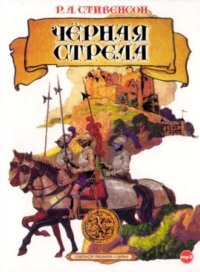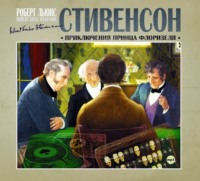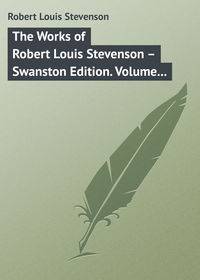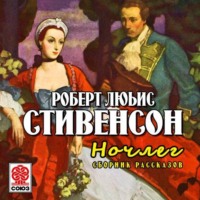 полная версия
полная версияAcross the Plains, with Other Memories and Essays
Thursday. – I suppose there must be a cycle in the fatigue of travelling, for when I awoke next morning, I was entirely renewed in spirits and ate a hearty breakfast of porridge, with sweet milk, and coffee and hot cakes, at Burlington upon the Mississippi. Another long day’s ride followed, with but one feature worthy of remark. At a place called Creston, a drunken man got in. He was aggressively friendly, but, according to English notions, not at all unpresentable upon a train. For one stage he eluded the notice of the officials; but just as we were beginning to move out of the next station, Cromwell by name, by came the conductor. There was a word or two of talk; and then the official had the man by the shoulders, twitched him from his seat, marched him through the car, and sent him flying on to the track. It was done in three motions, as exact as a piece of drill. The train was still moving slowly, although beginning to mend her pace, and the drunkard got his feet without a fall. He carried a red bundle, though not so red as his cheeks; and he shook this menacingly in the air with one hand, while the other stole behind him to the region of the kidneys. It was the first indication that I had come among revolvers, and I observed it with some emotion. The conductor stood on the steps with one hand on his hip, looking back at him; and perhaps this attitude imposed upon the creature, for he turned without further ado, and went off staggering along the track towards Cromwell followed by a peal of laughter from the cars. They were speaking English all about me, but I knew I was in a foreign land.
Twenty minutes before nine that night, we were deposited at the Pacific Transfer Station near Council Bluffs, on the eastern bank of the Missouri river. Here we were to stay the night at a kind of caravanserai, set apart for emigrants. But I gave way to a thirst for luxury, separated myself from my companions, and marched with my effects into the Union Pacific Hotel. A white clerk and a coloured gentleman whom, in my plain European way, I should call the boots, were installed behind a counter like bank tellers. They took my name, assigned me a number, and proceeded to deal with my packages. And here came the tug of war. I wished to give up my packages into safe keeping; but I did not wish to go to bed. And this, it appeared, was impossible in an American hotel.
It was, of course, some inane misunderstanding, and sprang from my unfamiliarity with the language. For although two nations use the same words and read the same books, intercourse is not conducted by the dictionary. The business of life is not carried on by words, but in set phrases, each with a special and almost a slang signification. Some international obscurity prevailed between me and the coloured gentleman at Council Bluffs; so that what I was asking, which seemed very natural to me, appeared to him a monstrous exigency. He refused, and that with the plainness of the West. This American manner of conducting matters of business is, at first, highly unpalatable to the European. When we approach a man in the way of his calling, and for those services by which he earns his bread, we consider him for the time being our hired servant. But in the American opinion, two gentlemen meet and have a friendly talk with a view to exchanging favours if they shall agree to please. I know not which is the more convenient, nor even which is the more truly courteous. The English stiffness unfortunately tends to be continued after the particular transaction is at an end, and thus favours class separations. But on the other hand, these equalitarian plainnesses leave an open field for the insolence of Jack-in-office.
I was nettled by the coloured gentleman’s refusal, and unbuttoned my wrath under the similitude of ironical submission. I knew nothing, I said, of the ways of American hotels; but I had no desire to give trouble. If there was nothing for it but to get to bed immediately, let him say the word, and though it was not my habit, I should cheerfully obey.
He burst into a shout of laughter. “Ah!” said he, “you do not know about America. They are fine people in America. Oh! you will like them very well. But you mustn’t get mad. I know what you want. You come along with me.”
And issuing from behind the counter, and taking me by the arm like an old acquaintance, he led me to the bar of the hotel.
“There,” said he, pushing me from him by the shoulder, “go and have a drink!”
The Emigrant TrainAll this while I had been travelling by mixed trains, where I might meet with Dutch widows and little German gentry fresh from table. I had been but a latent emigrant; now I was to be branded once more, and put apart with my fellows. It was about two in the afternoon of Friday that I found myself in front of the Emigrant House, with more than a hundred others, to be sorted and boxed for the journey. A white-haired official, with a stick under one arm, and a list in the other hand, stood apart in front of us, and called name after name in the tone of a command. At each name you would see a family gather up its brats and bundles and run for the hindmost of the three cars that stood awaiting us, and I soon concluded that this was to be set apart for the women and children. The second or central car, it turned out, was devoted to men travelling alone, and the third to the Chinese. The official was easily moved to anger at the least delay; but the emigrants were both quick at answering their names, and speedy in getting themselves and their effects on board.
The families once housed, we men carried the second car without ceremony by simultaneous assault. I suppose the reader has some notion of an American railroad-car, that long, narrow wooden box, like a flat-roofed Noah’s ark, with a stove and a convenience, one at either end, a passage down the middle, and transverse benches upon either hand. Those destined for emigrants on the Union Pacific are only remarkable for their extreme plainness, nothing but wood entering in any part into their constitution, and for the usual inefficacy of the lamps, which often went out and shed but a dying glimmer even while they burned. The benches are too short for anything but a young child. Where there is scarce elbow-room for two to sit, there will not be space enough for one to lie. Hence the company, or rather, as it appears from certain bills about the Transfer Station, the company’s servants, have conceived a plan for the better accommodation of travellers. They prevail on every two to chum together. To each of the chums they sell a board and three square cushions stuffed with straw, and covered with thin cotton. The benches can be made to face each other in pairs, for the backs are reversible. On the approach of night the boards are laid from bench to bench, making a couch wide enough for two, and long enough for a man of the middle height; and the chums lie down side by side upon the cushions with the head to the conductor’s van and the feet to the engine. When the train is full, of course this plan is impossible, for there must not be more than one to every bench, neither can it be carried out unless the chums agree. It was to bring about this last condition that our white-haired official now bestirred himself. He made a most active master of ceremonies, introducing likely couples, and even guaranteeing the amiability and honesty of each. The greater the number of happy couples the better for his pocket, for it was he who sold the raw material of the beds. His price for one board and three straw cushions began with two dollars and a half; but before the train left, and, I am sorry to say, long after I had purchased mine, it had fallen to one dollar and a half.
The match-maker had a difficulty with me; perhaps, like some ladies, I showed myself too eager for union at any price; but certainly the first who was picked out to be my bedfellow, declined the honour without thanks. He was an old, heavy, slow-spoken man, I think from Yankeeland, looked me all over with great timidity, and then began to excuse himself in broken phrases. He didn’t know the young man, he said. The young man might be very honest, but how was he to know that? There was another young man whom he had met already in the train; he guessed he was honest, and would prefer to chum with him upon the whole. All this without any sort of excuse, as though I had been inanimate or absent. I began to tremble lest every one should refuse my company, and I be left rejected. But the next in turn was a tall, strapping, long-limbed, small-headed, curly-haired Pennsylvania Dutchman, with a soldierly smartness in his manner. To be exact, he had acquired it in the navy. But that was all one; he had at least been trained to desperate resolves, so he accepted the match, and the white-haired swindler pronounced the connubial benediction, and pocketed his fees.
The rest of the afternoon was spent in making up the train. I am afraid to say how many baggage-waggons followed the engine, certainly a score; then came the Chinese, then we, then the families, and the rear was brought up by the conductor in what, if I have it rightly, is called his caboose. The class to which I belonged was of course far the largest, and we ran over, so to speak, to both sides; so that there were some Caucasians among the Chinamen, and some bachelors among the families. But our own car was pure from admixture, save for one little boy of eight or nine who had the whooping-cough. At last, about six, the long train crawled out of the Transfer Station and across the wide Missouri river to Omaha, westward bound.
It was a troubled uncomfortable evening in the cars. There was thunder in the air, which helped to keep us restless. A man played many airs upon the cornet, and none of them were much attended to, until he came to “Home, sweet home.” It was truly strange to note how the talk ceased at that, and the faces began to lengthen. I have no idea whether musically this air is to be considered good or bad; but it belongs to that class of art which may be best described as a brutal assault upon the feelings. Pathos must be relieved by dignity of treatment. If you wallow naked in the pathetic, like the author of “Home, sweet home,” you make your hearers weep in an unmanly fashion; and even while yet they are moved, they despise themselves and hate the occasion of their weakness. It did not come to tears that night, for the experiment was interrupted. An elderly, hard-looking man, with a goatee beard and about as much appearance of sentiment an you would expect from a retired slaver, turned with a start and bade the performer stop that “damned thing.” “I’ve heard about enough of that,” he added; “give us something about the good country we’re going to.” A murmur of adhesion ran round the car; the performer took the instrument from his lips, laughed and nodded, and then struck into a dancing measure; and, like a new Timotheus, stilled immediately the emotion he had raised.
The day faded; the lamps were lit; a party of wild young men, who got off next evening at North Platte, stood together on the stern platform, singing “The Sweet By-and-bye” with very tuneful voices; the chums began to put up their beds; and it seemed as if the business of the day were at an end. But it was not so; for, the train stopping at some station, the cars were instantly thronged with the natives, wives and fathers, young men and maidens, some of them in little more than nightgear, some with stable lanterns, and all offering beds for sale. Their charge began with twenty-five cents a cushion, but fell, before the train went on again, to fifteen, with the bed-board gratis, or less than one-fifth of what I had paid for mine at the Transfer. This is my contribution to the economy of future emigrants.
A great personage on an American train is the newsboy. He sells books (such books!), papers, fruit, lollipops, and cigars; and on emigrant journeys, soap, towels, tin washing dishes, tin coffee pitchers, coffee, tea, sugar, and tinned eatables, mostly hash or beans and bacon. Early next morning the newsboy went around the cars, and chumming on a more extended principle became the order of the hour. It requires but a copartnery of two to manage beds; but washing and eating can be carried on most economically by a syndicate of three. I myself entered a little after sunrise into articles of agreement, and became one of the firm of Pennsylvania, Shakespeare, and Dubuque. Shakespeare was my own nickname on the cars; Pennsylvania that of my bedfellow; and Dubuque, the name of a place in the State of Iowa, that of an amiable young fellow going west to cure an asthma, and retarding his recovery by incessantly chewing or smoking, and sometimes chewing and smoking together. I have never seen tobacco so sillily abused. Shakespeare bought a tin washing-dish, Dubuque a towel, and Pennsylvania a brick of soap. The partners used these instruments, one after another, according to the order of their first awaking; and when the firm had finished there was no want of borrowers. Each filled the tin dish at the water filter opposite the stove, and retired with the whole stock in trade to the platform of the car. There he knelt down, supporting himself by a shoulder against the woodwork or one elbow crooked about the railing, and made a shift to wash his face and neck and hands; a cold, an insufficient, and, if the train is moving rapidly, a somewhat dangerous toilet.
On a similar division of expense, the firm of Pennsylvania, Shakespeare, and Dubuque supplied themselves with coffee, sugar, and necessary vessels; and their operations are a type of what went on through all the cars. Before the sun was up the stove would be brightly burning; at the first station the natives would come on board with milk and eggs and coffee cakes; and soon from end to end the car would be filled with little parties breakfasting upon the bed-boards. It was the pleasantest hour of the day.
There were meals to be had, however, by the wayside: a breakfast in the morning, a dinner somewhere between eleven and two, and supper from five to eight or nine at night. We had rarely less than twenty minutes for each; and if we had not spent many another twenty minutes waiting for some express upon a side track among miles of desert, we might have taken an hour to each repast and arrived at San Francisco up to time. For haste is not the foible of an emigrant train. It gets through on sufferance, running the gauntlet among its more considerable brethren; should there be a block, it is unhesitatingly sacrificed; and they cannot, in consequence, predict the length of the passage within a day or so. Civility is the main comfort that you miss. Equality, though conceived very largely in America, does not extend so low down as to an emigrant. Thus in all other trains, a warning cry of “All aboard!” recalls the passengers to take their seats; but as soon as I was alone with emigrants, and from the Transfer all the way to San Francisco, I found this ceremony was pretermitted; the train stole from the station without note of warning, and you had to keep an eye upon it even while you ate. The annoyance is considerable, and the disrespect both wanton and petty.
Many conductors, again, will hold no communication with an emigrant. I asked a conductor one day at what time the train would stop for dinner; as he made no answer I repeated the question, with a like result; a third time I returned to the charge, and then Jack-in-office looked me coolly in the face for several seconds and turned ostentatiously away. I believe he was half ashamed of his brutality; for when another person made the same inquiry, although he still refused the information, he condescended to answer, and even to justify his reticence in a voice loud enough for me to hear. It was, he said, his principle not to tell people where they were to dine; for one answer led to many other questions, as what o’clock it was? or, how soon should we be there? and he could not afford to be eternally worried.
As you are thus cut off from the superior authorities, a great deal of your comfort depends on the character of the newsboy. He has it in his power indefinitely to better and brighten the emigrant’s lot. The newsboy with whom we started from the Transfer was a dark, bullying, contemptuous, insolent scoundrel, who treated us like dogs. Indeed, in his case, matters came nearly to a fight. It happened thus: he was going his rounds through the cars with some commodities for sale, and coming to a party who were at Seven-up or Cascino (our two games), upon a bed-board, slung down a cigar-box in the middle of the cards, knocking one man’s hand to the floor. It was the last straw. In a moment the whole party were upon their feet, the cigars were upset, and he was ordered to “get out of that directly, or he would get more than he reckoned for.” The fellow grumbled and muttered, but ended by making off, and was less openly insulting in the future. On the other hand, the lad who rode with us in this capacity from Ogden to Sacramento made himself the friend of all, and helped us with information, attention, assistance, and a kind countenance. He told us where and when we should have our meals, and how long the train would stop; kept seats at table for those who were delayed, and watched that we should neither be left behind nor yet unnecessarily hurried. You, who live at home at ease, can hardly realise the greatness of this service, even had it stood alone. When I think of that lad coming and going, train after train, with his bright face and civil words, I see how easily a good man may become the benefactor of his kind. Perhaps he is discontented with himself, perhaps troubled with ambitions; why, if he but knew it, he is a hero of the old Greek stamp; and while he thinks he is only earning a profit of a few cents, and that perhaps exorbitant, he is doing a man’s work, and bettering the world.
I must tell here an experience of mine with another newsboy. I tell it because it gives so good an example of that uncivil kindness of the American, which is perhaps their most bewildering character to one newly landed. It was immediately after I had left the emigrant train; and I am told I looked like a man at death’s door, so much had this long journey shaken me. I sat at the end of a car, and the catch being broken, and myself feverish and sick, I had to hold the door open with my foot for the sake of air. In this attitude my leg debarred the newsboy from his box of merchandise. I made haste to let him pass when I observed that he was coming; but I was busy with a book, and so once or twice he came upon me unawares. On these occasions he most rudely struck my foot aside; and though I myself apologised, as if to show him the way, he answered me never a word. I chafed furiously, and I fear the next time it would have come to words. But suddenly I felt a touch upon my shoulder, and a large juicy pear was put into my hand. It was the newsboy, who had observed that I was looking ill, and so made me this present out of a tender heart. For the rest of the journey I was petted like a sick child; he lent me newspapers, thus depriving himself of his legitimate profit on their sale, and came repeatedly to sit by me and cheer me up.
The Plains of NebraskaIt had thundered on the Friday night, but the sun rose on Saturday without a cloud. We were at sea – there is no other adequate expression – on the plains of Nebraska. I made my observatory on the top of a fruit-waggon, and sat by the hour upon that perch to spy about me, and to spy in vain for something new. It was a world almost without a feature; an empty sky, an empty earth; front and back, the line of railway stretched from horizon to horizon, like a cue across a billiard-board; on either hand, the green plain ran till it touched the skirts of heaven. Along the track innumerable wild sunflowers, no bigger than a crown-piece, bloomed in a continuous flower-bed; grazing beasts were seen upon the prairie at all degrees of distance and diminution; and now and again we might perceive a few dots beside the railroad which grew more and more distinct as we drew nearer till they turned into wooden cabins, and then dwindled and dwindled in our wake until they melted into their surroundings, and we were once more alone upon the billiard-board. The train toiled over this infinity like a snail; and being the one thing moving, it was wonderful what huge proportions it began to assume in our regard. It seemed miles in length, and either end of it within but a step of the horizon. Even my own body or my own head seemed a great thing in that emptiness. I note the feeling the more readily as it is the contrary of what I have read of in the experience of others. Day and night, above the roar of the train, our ears were kept busy with the incessant chirp of grasshoppers – a noise like the winding up of countless clocks and watches, which began after a while to seem proper to that land.
To one hurrying through by steam there was a certain exhilaration in this spacious vacancy, this greatness of the air, this discovery of the whole arch of heaven, this straight, unbroken, prison-line of the horizon. Yet one could not but reflect upon the weariness of those who passed by there in old days, at the foot’s pace of oxen, painfully urging their teams, and with no landmark but that unattainable evening sun for which they steered, and which daily fled them by an equal stride. They had nothing, it would seem, to overtake; nothing by which to reckon their advance; no sight for repose or for encouragement; but stage after stage, only the dead green waste under foot, and the mocking, fugitive horizon. But the eye, as I have been told, found differences even here; and at the worst the emigrant came, by perseverance, to the end of his toil. It is the settlers, after all, at whom we have a right to marvel. Our consciousness, by which we live, is itself but the creature of variety. Upon what food does it subsist in such a land? What livelihood can repay a human creature for a life spent in this huge sameness? He is cut off from books, from news, from company, from all that can relieve existence but the prosecution of his affairs. A sky full of stars is the most varied spectacle that he can hope. He may walk five miles and see nothing; ten, and it is as though he had not moved; twenty, and still he is in the midst of the same great level, and has approached no nearer to the one object within view, the flat horizon which keeps pace with his advance. We are full at home of the question of agreeable wall-papers, and wise people are of opinion that the temper may be quieted by sedative surroundings. But what is to be said of the Nebraskan settler? His is a wall-paper with a vengeance – one quarter of the universe laid bare in all its gauntness.
His eye must embrace at every glance the whole seeming concave of the visible world; it quails before so vast an outlook, it is tortured by distance; yet there is no rest or shelter till the man runs into his cabin, and can repose his sight upon things near at hand. Hence, I am told, a sickness of the vision peculiar to these empty plains.
Yet perhaps with sunflowers and cicadæ, summer and winter, cattle, wife and family, the settler may create a full and various existence. One person at least I saw upon the plains who seemed in every way superior to her lot. This was a woman who boarded us at a way station, selling milk. She was largely formed; her features were more than comely; she had that great rarity – a fine complexion which became her; and her eyes were kind, dark, and steady. She sold milk with patriarchal grace. There was not a line in her countenance, not a note in her soft and sleepy voice, but spoke of an entire contentment with her life. It would have been fatuous arrogance to pity such a woman. Yet the place where she lived was to me almost ghastly. Less than a dozen wooden houses, all of a shape and all nearly of a size, stood planted along the railway lines. Each stood apart in its own lot. Each opened direct off the billiard-board, as if it were a billiard-board indeed, and these only models that had been set down upon it ready made. Her own, into which I looked, was clean but very empty, and showed nothing homelike but the burning fire. This extreme newness, above all in so naked and flat a country, gives a strong impression of artificiality. With none of the litter and discoloration of human life; with the paths unworn, and the houses still sweating from the axe, such a settlement as this seems purely scenic. The mind is loth to accept it for a piece of reality; and it seems incredible that life can go on with so few properties, or the great child, man, find entertainment in so bare a playroom.









